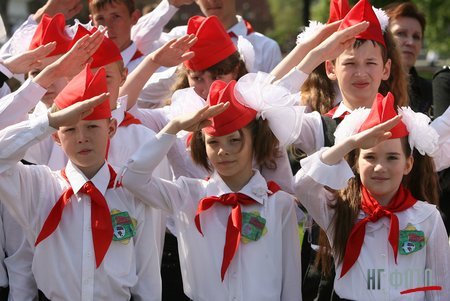Part 1
Human factor
Living under socialism, I always heard from the radio, TV, and in school that socialism makes labor a pleasure. This dominant narrative instilled in my mind the concept that people are so happy to give "their all" for their country, because the wise government, led by the Communist party, steer the country to a brighter future, thus creating a better future for all the progressive humankind.
Up until a certain time, I trusted this rhetoric. It felt extremely comfortable. It seemed to me that if something bad happened, the entire country would come to my rescue.
My family lived modestly, from paycheck to paycheck. Yet, since everybody around us lived like this, it seemed like a norm. All people around me did not envy greedy capitalists and looked down at the horrible West where all people “are wolves to one another” and where capitalists suck people dry.

The first time when I doubted this narrative when I was in the fourth grade, during “Subotnick.” Subotnick (from the Russian word Суббота = Saturday) is a pro-bono work on the weekend for the public good.

Usually, this involved cleaning parks or streets or collecting metal scrap or old papers. It was considered to be voluntary work, yet the type of work that no one could refuse since most people were part of some communist organizations. And it was the organizations that decided for all their members that they want to do public volunteer work. Back then, I was a member of the communist “pioneer” organization that all the children are enrolled automatically.

So, I recall us helping to plant some small trees in the nearby park. As I was shoveling the dirt, I noticed a friend of mine, who just stood there doing nothing when the teacher wasn’t looking. When I confronted him on his behavior, he introduced me to a famous proverb
“Work is not a wolf and is not going to run to the forest.”
Later in life, I heard a joke that summarized the general attitude of people to that voluntary work even more clearly. The joke goes as follows…
|
In the forest, all animals were taking part in Subotnik, except for a hare. The bear, who was a responsible representative for the event, sent the badger - his emissary to the hare’s lair. “Why aren’t you come to the Subotnik?” the badger inquired. “I cannot come,” said the hare, popping his head out of his layer. “Why?” “Because I am in the middle of sexual intercourse.” The bear wasn’t happy with that answer and decided to come to see the hare personally. However, the hare gave him exactly the same answer “I cannot come because I'm having sexual intercourse.” “Who are you having the intercourse with?” the bear asked. “With your subotnik!” |
Since that time, I have started to notice this type of attitude toward work quite often.
I recall participating in a required by my Civil Engineering College summer training at a building site on the outskirts of Moscow. I was assigned to be a helper to a partition installer. The work started at 8 o’clock and consisted of carrying sheets of plasterboard, installing them inside of the metal channel, and then fastening the sheets to the wooden frame. At eleven o’clock, the guys from the team that worked on the floor collected some money and sent one of the guys to the liquor store that opened at that time. When he returned, everybody sat on the stack of plasterboard, drank vodka, and played cards.
So much for pleasurable labor.
The quality work
Did all people do a poor job under socialism? Absolutely not. In any society, some people have found themselves and love what they do.
However, most people don’t find themselves and don’t do what they like. Otherwise, most of them would do something like dancing, painting pictures, and writing fiction or poetry.
It’s not that they all hate their jobs, although there are people like this as well. More likely, they don’t care about it and are compelled to do a good job by two factors: income and the fear of losing it.
Generally, in the free market economy, a better specialist makes more money. If you own a business, its reputation depends on the quality of a product or a service that you provide to a customer. Thus, you would rather pay more to a qualified and reliable specialist, than pay less to someone who jeopardizes those objectives. However, if such a specialist demands too much money relative to specialists with similar qualifications, you as an owner can refuse such a demand and, if this specialist leaves the business, you can find a replacement that would accept the compensation that you offer.
The other factor is fear. Workers try harder because they are afraid to lose their job, which is their source of income.
Now, imagine that these two factors don’t exist. That is … no matter how well you perform on your job your compensation would be the same as someone underqualified or lazy. Well, the difference would still exist, but not a very insignificant one.
Also, no matter what you do or how you do it you’d never lose your job; well almost never. As long as you keep your mouth shut and not saying anything against the dominant narrative, and when you do open it you say what is expected. That’s socialism.
The motto of theoretical socialism is “Take from everyone by their abilities and give everyone by their labor.” However, in reality, it is “No matter how you work and what you know, you will get equal or close to equal compensation.”
The emblem of Soviet labor was hammer and sickle.

I recall a funny little song regarding this emblem that translated approximately like this
|
A hammer is on top, and a sickle is below, This is the Soviet coat of arms. You either reap or strike, Still in the end you will get ... nothing. |
This led to poor quality of products and services, to underproduction, long lines in stores, stealing from the place of work, and barter.

I recall another Soviet proverb, which I can translate approximately as follow
“If not to steal from the place of work you won’t have anything to eat”
Even a special new word was coined "несун" which means a person who stole something from the place of work.

My mother worked in a prestigious publishing house “Children’s literature.” Since at that time, people still read books, and children’s books were in short supply, books were her barter base.
